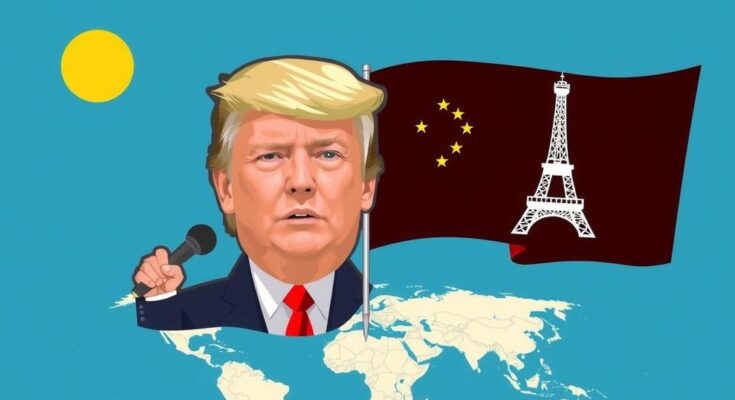President-elect Trump aims to withdraw from the Paris Climate Agreement soon after taking office, potentially altering the timeline compared to his first exit. Experts express concern over trust issues and global influence, while supporters cite economic sovereignty benefits. Overall, U.S. participation in climate initiatives remains crucial for global cooperation.
President-elect Donald Trump has signaled intentions to withdraw the United States from the Paris Climate Agreement soon after taking office, but this potential second withdrawal may differ significantly from the first. Initially established at the U.N. Climate Change Conference in 2015, the Paris Agreement binds nearly 195 countries to cooperate on climate change mitigation. The United States formally joined under President Obama’s leadership in 2016, but Trump’s first attempt to leave was hindered by a mandatory three-year waiting period as stipulated in Article 28 of the agreement. Consequently, the official exit only occurred at the end of 2020.
Upon assuming the presidency, Joe Biden swiftly reinstated U.S. participation in the agreement in 2021. During the campaign, Trump announced his intention to withdraw again, suggesting that this time frame could be significantly reduced compared to his prior exit. David Waskow, director of the International Climate Initiative at the World Resources Institute, emphasized, “It would be a very different timeline now.”
Experts warn that a second U.S. withdrawal could undermine global trust in climate initiatives. Max Boykoff, a professor at CU Boulder, expressed concern about the potential influence of U.S. policies on other nations’ commitment to the treaty. This sentiment reflects fears that nations observing U.S. actions might be incentivized to exit as well, particularly with the emergence of leaders like Argentina’s President Javier Milei, who is contemplating withdrawal.
Supporters of Trump’s potential exit argue that abandoning the Paris Agreement would reclaim U.S. sovereignty and lessen regulatory burdens. H. Sterling Burnett from the Heartland Institute stated, “The benefits of exiting the Paris climate agreement are many, first and foremost reclaiming U.S. sovereignty while respecting the rule of law.” He further contended that the demands of the agreement impose unnecessary costs on Americans while disadvantaging the U.S. in comparison to countries like China.
Mandy Gunasekara, former chief of staff at the EPA, has advocated for a complete withdrawal from both the Paris Agreement and the U.N. Framework Convention on Climate Change (UNFCCC), arguing for more permanent measures against agreements that she perceives as detrimental to the American economy.
Global leaders caution about the implications of U.S. withdrawal on the future of the Paris Agreement. António Guterres, Secretary-General of the United Nations, remarked on the resilience of the agreement, warning that while it may survive without full U.S. participation, it could become significantly weakened. The importance of U.S. engagement and leadership in achieving climate objectives remains a substantial topic of discussion.
The Paris Climate Agreement, adopted in 2015, represents an international commitment to address climate change and limit global warming. The treaty sets forth legally binding obligations for participant nations, which include measures for reducing greenhouse gas emissions and enforcing transparency in reporting. Although the U.S. initially committed to this framework under President Obama, Trump’s administration signified a shift in climate policy, emphasizing national sovereignty and economic interests over global environmental commitments. President Biden’s return to the agreement reflected a renewed U.S. leadership role in climate initiatives, underscoring the complexities surrounding U.S. engagement in global climate governance.
In summary, a second potential withdrawal from the Paris Agreement under Trump’s presidency would differ significantly from the first due to a changed political landscape and the lack of a mandatory waiting period. Notably, such a withdrawal could result in decreased international trust and possibly influence other nations to reconsider their commitments. Critics argue against the withdrawal based on both environmental impact and global diplomatic relations, while supporters cite economic sovereignty and competitive advantage as key benefits. The future of U.S. participation in global climate agreements remains a critical issue with far-reaching implications.
Original Source: www.foxnews.com




